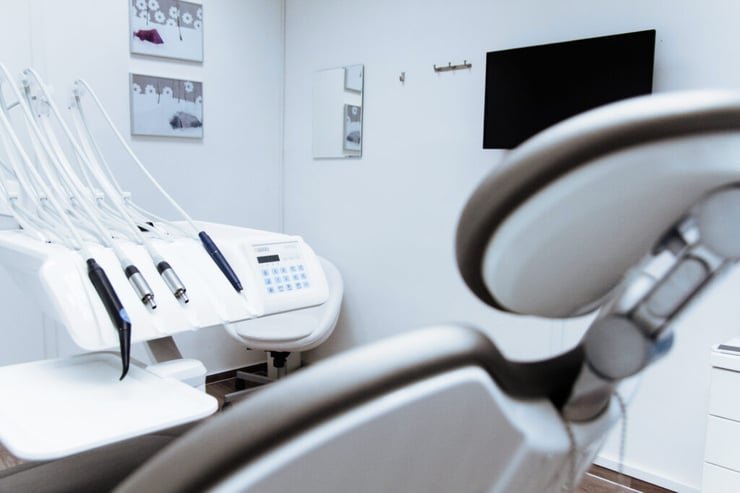Owning Your Own Dental Practice: How to Avoid the Pitfalls

You’ve put in the time studying, training, and working to become a dental professional. Now you are considering making the leap into practice ownership. Whether you want to purchase your first practice or build it from scratch, you need to move forward confidently. Don’t hold back on your dreams from fear of failure.
Nevertheless, practice ownership comes with a significant monetary investment and there may be stumbling blocks along your journey.
What are the potential pitfalls to avoid?
Not surprisingly, the common pitfalls are often related to how you manage your finances, both your funding from a lender and your practice income. Read on for the common obstacles or pitfalls to avoid and how to ensure a successful outcome for your investment.
Inadequate build-out funding
One risk for dentists building their first practice is inaccurately estimating the funding needed to fully complete the project. It is common to overlook less obvious needs and to forget to budget for things like parking areas for easy access.
The new owner may also rely on an inexperienced contracting team that does not understand the unique requirements of the dental office, such as specialty plumbing and enhanced wiring for today’s digital equipment.
Finding yourself short of funds before completing your project can create significant stress as you are left to choose between cutting back on your plans and career goals or taking on greater debt. Ultimately, it may lead to poor decision-making.
Shortage of practice income
As your practice opens and gets underway, you may experience problems establishing adequate patient flow and generating income to cover expenses. Introducing a new service or business to a community requires significant marketing and networking to improve visibility, attract patients, and generate loyalty.
It can take two to three years to establish a patient base that can support and sustain a full-time dental practice. You may need to balance your scheduling time with a part-time associateship so you have time to build your business while ensuring you have income to cover your practice overhead and your debts.
Overpaying for a practice
Some new doctors try to save money by managing the acquisition process themselves rather than working with a professional practice broker. When this is done, they rely on the selling doctor’s valuation and terms of agreement. You may end up paying a higher price for the practice than it is worth.
To avoid this, hire a professional appraiser who can establish a fair market value of the practice. Work with a broker who specializes in dental practices.
Declining revenues after transition
When purchasing a new practice, you may experience declining revenues after the transition. When a new doctor is introduced, it is common for some patients to shop around. Look into and try to understand the cause of revenue drop to create a plan to get back on track.
Before transitioning to your new practice, reach out to patients with a personal letter describing your background and services. Consider offering a promotional discount to bring existing patients back to the office.
Seven steps to a smooth transition
Be prepared with a back-up plan in case you have problems during your transition. You don’t want to waste time floundering. Instead, work toward a solution.
Here are seven key steps for a smooth transition:
- Activate your team. Before starting your project, consider working with a team of practice acquisition or start-up professionals. By working with this team from start to finish, you ensure your interests are protected. This team can guide you through a significant project without becoming wrapped up with potential obstacles or frustrations.
You may want to include the following members on your team:- Practice Acquisition: Attorney, practice broker, lender, accountant, and insurance broker
- Start-up Practice: Attorney, general contractor, lender, accountant, equipment supplier, insurance broker
- Do your due diligence before purchasing or starting a practice. Your goal with due diligence is to avoid unpleasant surprises. Ask to see charts, reports, inventories, and schedules. This information gives details into the daily operations of the practice you are purchasing.
For startup practices, due diligence practices help you prepare more comprehensive plans for technology, staffing, marketing, OSHA guidelines, and critical business requirements.
You also must understand the population size in the area and how their dental care needs are currently being met, or not met, by existing dentists in the area. - Monitor practice performance. Examine your practice statistics regularly to help maintain the health of your dental practice. Looking at profit and loss numbers can help diagnose and treat problems, just as an X-ray helps diagnose cavities.
To better understand the strengths and weaknesses of your practice and systems, ask us about the Milestones program from LenDRgroup Consulting’s practice financing service. This practice monitoring tool helps you establish baseline measurements for everything from practice production to operating expenses. - Manage your cash flow. Cash flow shortages are possible at times with any business, no matter what size it is. Consider planning and managing your cash flow by setting daily and monthly production goals, paying down debt, and saving 10% of income after expenses are paid. Managing your cash flow ensures you have cash on hand in the event of an unplanned obstacle or a bad month.
- Beef up your marketing. Whether you use a marketing agency or consultant or choose to handle these efforts yourself, create a consistent marketing program to build awareness and recognition for your practice.
If/when your budget allows, consider using internet ads, newspapers, billboards, or even radio and television. Reach out and introduce yourself to members of the community. For a simple and inexpensive marketing method, request referrals from your current patients.
Don’t forget about social media. Facebook can be a great place to create a community. It gives your patients a place to comment and refer others. - Improve your treatment presentation skills. Work with your staff to improve your communication and verbal skills. This will help the team present potential treatments to patients and handle patient concerns appropriately.
Keep track of the presented treatments and the patient’s decision on whether or not to follow through with your recommendation. By documenting the reason the treatment is rejected or accepted, you can create a more complete patient file. This may help you understand the techniques you and your staff are doing well and what needs practice. - Know your strengths and build on them. Surround yourself with specialists, staff, and team members who complement your skills. While you work to improve your weaknesses, your strengths will set the tone and style for your practice.
Transitioning to practice ownership may have its occasional downsides. However, if you rely on your team of professional advisors and plan your success in advance, you can make the transition effectively and profitably.
At LenDRgroup Consulting, our team cares about your dental practice’s long-term success. Whether you need practice financing or business consulting, we will customize a plan that fits the unique needs of your practice and your career.
Our lending platform consists of 300+ dental and healthcare-specific lenders. We built this network to help dentists, veterinarians, and physicians. We want you to achieve your dreams of dental practice ownership while eliminating practice financing obstacles.
To date, we have helped hundreds of healthcare professionals start, expand, and grow their practices. LenDRgroup Consulting understands your business needs and can help you avoid costly mistakes. So, let’s get started.
Contact us today to schedule your consultation.



